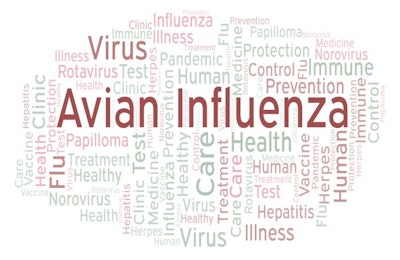
The highly pathogenic avian influenza (HPAI) outbreak in North America has expanded into Minnesota, while additional cases have been confirmed in Iowa, South Dakota and Nebraska.
Avian influenza in Minnesota
HPAI was confirmed in a commercial turkey flock in Meeker County, the Minnesota Board of Animal Health (MBOAH) and the United States Department of Agriculture (USDA) Animal and Plant Health Inspection Service (APHIS) announced in separate press releases.
MBOAH reported that there were 289,000 14-week-old toms in the flock. An increase in mortality and signs of depression were noticed in the flock, which was tested on March 25 at the Minnesota Poultry Testing Laboratory (MPTL) and the University of Minnesota Veterinary Diagnostic Laboratory (VDL). Those tests were then sent and to the USDA Veterinary Services Laboratories (NVSL) in Ames, Iowa, which confirmed the presence of HPAI.
In addition to the commercial turkey flock in Meeker County, HPAI was a backyard mixed flock of chickens, ducks and geese in Mower County. There, 17 birds were susceptible.
“These are the first cases of HPAI in the state of Minnesota since 2015,” said Dr. Dale Lauer, MBOAH poultry program director. “Poultry producers and backyard flock owners need to be on alert and contact their veterinarian immediately if they see any changes in their flocks. Everyone in poultry facilities needs to follow the site’s biosecurity protocols every time to prevent the spread of disease.”
The sites are quarantined, and depopulation of birds on the premises is already underway.
Avian influenza in Iowa
Iowa Department of Agriculture and Land Stewardship (IDALS) and APHIS confirmed another positive case of highly pathogenic avian influenza (HPAI) in Buena Vista County, IDALS announced in a press release issued on March 24. The virus was found in a commercial turkey flock.
This is the third confirmed case of HPAI in Buena Vista County, Iowa. The first case was in a flock of 49,816 commercial turkeys on March 6 and the second case was in a flock of more than 5.3 million commercial laying hens on March 17.
“This is a difficult time for poultry producers as HPAI continues to impact farms across Iowa and the United States,” said Iowa Agriculture Secretary Mike Naig. “We continue to work with them, USDA and other industry stakeholders to implement our plans and minimize the spread of the virus. Biosecurity remains the best line of defense to protect the health of our poultry flocks.”
APHIS stated there were 53,804 turkeys in the state’s most recent case.
In addition to the three HPAI cases in Buena Vista County, the presence of the virus was also confirmed on March 10 in a commercial flock of 915,925 laying hens in Taylor County.
Avian influenza in Nebraska
According to information on the APHIS website, a second case of HPAI has been confirmed in Butler County, Nebraska.
In this case, the virus was found in a flock of 417,000 commercial broilers, and the presence of HPAI was confirmed on March 24.
Nebraska’s only other case of HPAI in commercial poultry was in another broiler flock in Butler County. That case involved 570,000 broilers and the presence of HPAI in the flock was confirmed on March 22.
Avian influenza in South Dakota
HPAI continues to spread in South Dakota, with its most recent case occurring in a commercial turkey flock in Jerauld County. That flock included 45,000 turkeys, and was confirmed on March 24.
The Jerauld County case marks the first in that county, but the 12th in the state. Other counties with flocks to be affected and the number of flocks affected in those counties are Edmunds (1), Kingsbury (2), Beadle (2) Hanson (2), Charles Mix (3) and Hutchinson (1).
One of the Kingsbury cases involved a flock of commercial layers, while one of the cases in Charles Mix County was described as a commercial mixed poultry flock. All other HPAI cases in South Dakota, according to APHIS, were commercial turkey flocks.

















